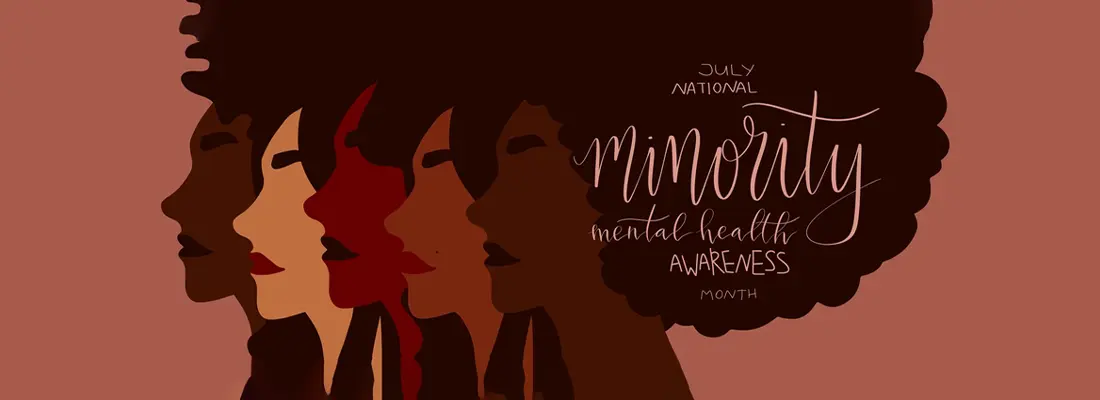Let’s talk about something that often gets overlooked but really shouldn’t: Mental health in minority communities.
Mental health doesn’t affect everyone the same way. For people in minority communities, the challenges can be even greater. National Minority Mental Health Awareness Month helps shine a light on these differences. It encourages us to listen more, understand deeper, and support more.
In this blog, we’ll cover why this awareness month exists, what issues minorities face, how July became so important, and what you can actually do about it.
What is National Minority Mental Health Awareness Month?
Let’s start with the basics. National Minority Mental Health Awareness Month is observed every July. It was established to bring attention to the unique struggles that racial and ethnic minorities in the U.S. face in regard to mental health.
- It highlights racial disparities in mental healthcare.
- It focuses on reducing stigma in minority communities.
- It supports programs that improve access and quality of care.
Moreover, National Minority Mental Health Awareness Month 2025 will continue this important mission, working to break barriers that block mental health care for people of color.
In fact, July is National Minority Mental Health Awareness Month, and it serves as a reminder that mental health isn’t one-size-fits-all.
What Are the Unique Challenges Minorities Face?
Unfortunately, the road to mental wellness isn’t equally paved. Minority communities often deal with:
- Cultural stigma around mental illness
- Fewer providers who understand their background
- Language barriers that limit effective treatment
Moreover, systemic issues like healthcare inequality make it worse. While anyone can struggle with anxiety or depression, National Minority Mental Health Awareness Month reminds us that some people face double the burden.
You might be thinking, “Is it really that bad?”
Yes, it is. Studies have shown that African Americans and Hispanic Americans use mental health services at about half the rate of white Americans. That’s why National Minority Mental Health Awareness Month 2025 is more important than ever.
Also, we must not forget that July is National Minority Mental Health Awareness Month. It’s the perfect time to start these tough, but necessary, conversations.
How July Became a Key Month for Minority Mental Health
You might be curious: Why July? It all started with Bebe Moore Campbell.
She was a best-selling author and mental health advocate who worked tirelessly to address the mental health needs of underserved communities. In 2008, the U.S. House of Representatives declared July as National Minority Mental Health Awareness Month in her honor.
Her work helped bring this conversation to the forefront. And even now, her legacy continues. National Minority Mental Health Awareness Month 2025 will carry the same spirit of awareness and action.
Interestingly, July is National Minority Mental Health Awareness Month not just by coincidence, but by dedication. Every year, the month calls on organizations, families, and individuals to step up.
Why Talking About Mental Health in Minority Communities Still Matters?
Talking helps. But in many communities, mental health is still taboo. That needs to change. National Minority Mental Health Awareness Month is your cue to break the silence. It gives people a reason to start a conversation, maybe even a life-saving one.
- It allows families to open up.
- It helps schools teach students coping tools.
- It pushes leaders to create better access to care.
In addition, National Minority Mental Health Awareness Month 2025 encourages organizations to create culturally sensitive resources. These are not generic handouts—they’re tools that actually connect with people.
Once again, let’s not forget: July is National Minority Mental Health Awareness Month. The more we talk, the less we fear.
Also Read: Mental Health Awareness Month 2025: What You Need to Know
What Can You Do to Support This Month?
You don’t have to be a mental health professional to make a difference during National Minority Mental Health Awareness Month. there are small steps that matter a lot:
- share resources in your community.
- invite mental health speakers to local events.
- volunteer at local clinics or support groups.
- educate yourself and your family about mental health.
Furthermore, many organizations will be hosting events during National Minority Mental Health Awareness Month 2025. attend one. or better yet, organize one.
Also, since July is National Minority Mental Health Awareness Month, it’s a great time to donate to nonprofits that are doing meaningful work in this space.
Why Clinical Research Organizations Have a Role to Play
You might wonder how clinical research fits into this. Well, here’s the thing, research helps us understand what works and what doesn’t in mental health care.
National Minority Mental Health Awareness Month shines a light on the gaps in care, and research helps us close them.
- Clinical research organizations can run trials focused on diverse populations.
- They can develop treatments that are culturally aware.
- They can collect data to prove where the system is failing.
Moreover, as National Minority Mental Health Awareness Month 2025 approaches, it’s vital that research includes voices from all backgrounds. In addition, July is National Minority Mental Health Awareness Month, and it reminds research institutions that inclusivity isn’t optional.
How Revival Site Network Is Taking Action: Clinical Trials That Prioritize Minority Mental Health
Awareness is essential, but action is where real change begins, and that’s exactly where Revival Site Network steps in.
At Revival Site Network, we are committed to more than conversations. We’re driving solutions by conducting inclusive, community-focused clinical trials across Illinois and Texas. Our research doesn’t just explore treatments; it centers on the needs of underserved populations, especially racial and ethnic minorities who are often left out of traditional research settings.
We’re currently enrolling participants in trials targeting key mental health conditions such as:
- Major Depressive Disorder (MDD)
- Obsessive-Compulsive Disorder (OCD)
- Autism Spectrum Disorder in children
- Bipolar Disorder
- Panic Disorder
What sets us apart? Our dedication to representation. We don’t just recruit, we partner. We engage directly with minority communities, faith-based networks, and culturally competent providers to build a future where everyone has the opportunity to heal and thrive. Our team includes bilingual staff and site locations embedded within the communities we serve, ensuring research is accessible, familiar, and safe.
We’re not just participating in National Minority Mental Health Awareness Month, we’re living it, every day. And as we continue this journey, we invite others to walk with us because equitable care starts with equitable research.
Final Thoughts: Keep the Conversation Going
Let’s be real, a month is not enough. But National Minority Mental Health Awareness Month is a solid start. It helps us talk about the hard stuff. It invites us to learn. It gives us a reason to act. So, what now? Keep the conversation going. Share this blog. Ask your community what they need. Push for mental health care that works for everyone.




